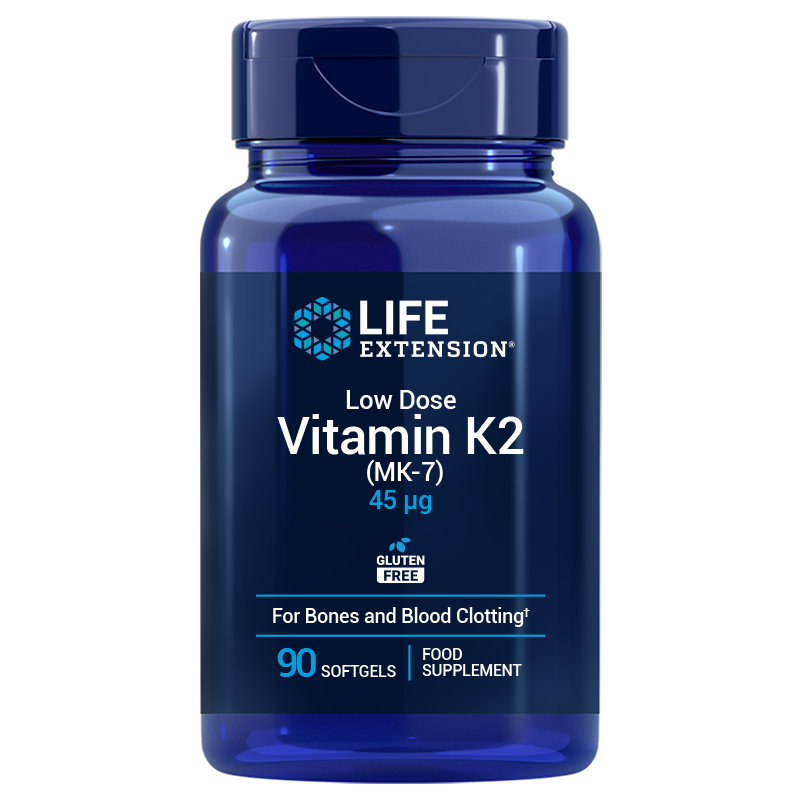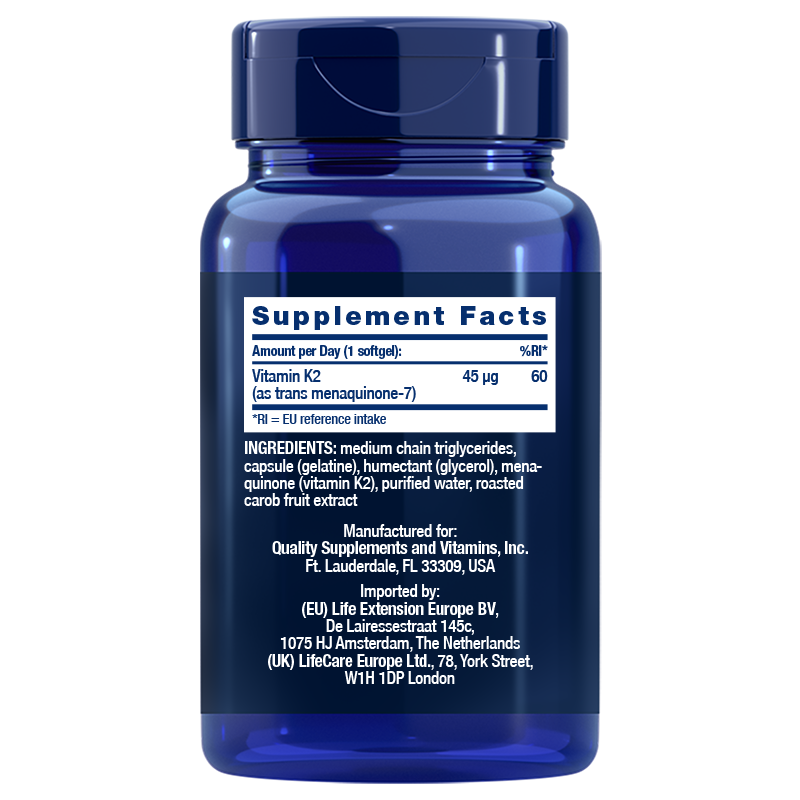Low Dose Vitamin K2, EU
Vitamin K for bone density and cardiovascular support
Low Dose Vitamin K2, EU
Vitamin K for bone density and cardiovascular support
For you, if you are interested in improving your cardiovascular, arterial, and bones health
The ingredients in Low-Dose Vitamin K2 can:
- Help counter calcification of the arteries, thereby supporting cardiovascular health
- Remain biologically active in the body longer than other K forms
- Play a critical role in maintaining healthy bone density
- Offer an excellent alternative to diet-based K2 sources such as milk, eggs, cheese, and fish
Vitamin K in Low-Dose Vitamin K2 can help contribute to counter calcification of the arteries thereby helping to maintain a healthy cardiovascular system, and support building healthy bones.

on orders over € 69
We have a 100 days return policy, not the standard 30 days!
Order before 11:00 CET, for same day shipping (Mon-Fri)
We can help you in 6 languages
Health benefits at a glance:
Vitamin K found in Low-Dose Vitamin K2 can help contribute to counter calcification of the arteries thereby helping to maintain a healthy cardiovascular system.
Vitamin K2 is also vital in transporting calcium from the bloodstream into the bone, thereby helping to maintain normal bone density.
Why it works:
Calcification of the arteries can be a natural consequence of the aging process. Luckily, vitamin K can contribute to counter this phenomenon.
Without adequate vitamin K levels, calcium in the blood can bind to the arterial wall resulting in calcification [6,7]. As people age, even a minor deficiency of vitamin K can pose risks to the vascular system.
An abundance of clinical data also reveals that vitamin K plays a role in maintaining normal and healthy bone density; vitamin K helps this by facilitating the transport of calcium from the bloodstream into the bones [1-5].
Furthermore, vitamin K also helps calcium-regulating proteins function better in the arteries. Inadequate levels of vitamin K can also result in increased circulating levels of undercarboxylated osteocalcin which is associated with an increased bone loss in postmenopausal women [8,9].
The science behind the product:
Human clinical studies report that vitamin K has an important role to maintain healthy bone density. This is done by facilitating the transport of calcium from the bloodstream into the bone [1-5]. Matrix Gla-protein (MGP) is a vitamin K-dependent protein and has to be carboxylated to work effectively.
Insufficient amounts of vitamin K can result in inactive uncarboxylated MGP which can accumulate at sites of arterial calcification [10,11]. Since MGP can potentially inhibit arterial calcification, MGP plays a role in the aging cardiovascular system.
Insufficient vitamin K in our body can lead the calcium in the blood to bind to the arterial wall resulting in calcification of the arteries [6,7].
Researchers in Rotterdam conducted a large clinical trial study on heart health, about vitamin K2. 4,800 study participants were enrolled in the seven-year-long study. Study participants who received the highest amount of vitamin K2 in their diet experienced better cardiovascular condition [12].
Animal studies report that proper intake of vitamin K can block the progress of further calcium accumulation. Furthermore, it was also shown to trigger up to 37% regression of preformed arterial calcification [13,14].
How to use:
- Take one (1) softgel daily with food, or as recommended by a healthcare practitioner.
Serving size: 1 softgel
Servings per container: 90
| Amount per day (1 softgel): | %RI* | |
|---|---|---|
| Vitamin K2 (as trans menaquinone-7) | 45 µg | 60 |
*RI = EU reference intake **No RI available
INGREDIENTS:
Medium chain triglycerides, capsule (gelatine), humectant (glycerol), menaquinone (vitamin K2), purified water, roasted carob fruit extract
non-GMO
DIRECTIONS:
Take one (1) softgel daily with food.
CAUTION:
If you are taking Warfarin (Coumadin®) or related medications, consult your healthcare provider before taking this product.
WARNINGS:
Keep out of reach of children.
Do not exceed recommended daily dose.
Do not purchase if outer seal is broken or damaged.
Consult with your physician if you are undergoing treatment for a medical condition or if you are pregnant or lactating.
A food supplement should not be used as a substitute for a varied and balanced diet and a healthy lifestyle. Store tightly closed in a cool, dry place.
- J Bone Miner Metab. 2001;19(3):146-9.
- Osteoporos Int. 2007 Jul;18(7):963-72.
- J Bone Miner Res. 2007 Apr;22(4):509-19.
- Br J Nutr. 2009 Oct;102(8):1171-8.
- Blood. 2007 Apr 15;109(8):3279-83.
- Thromb Haemost. 2008 Oct;100(4):593-603.
- Clin J Am Soc Nephrol. 2008 Sep;3(5):1504-10.
- Vitam Horm. 2008;78:393-416.
- Curr Drug Saf. 2006 Jan;1(1):87-97.
- Atherosclerosis. 2012 Dec;225(2):397-402.
- Adv Nutr. 2012 Mar 1;3(2):166-73.
- J Nutr. 2004 Nov;134(11):3100-5.
- Blood. 2007 Apr 1;109(7):2823-31.
- J Vasc Res. 2003 Nov-Dec;40(6):531-7.



